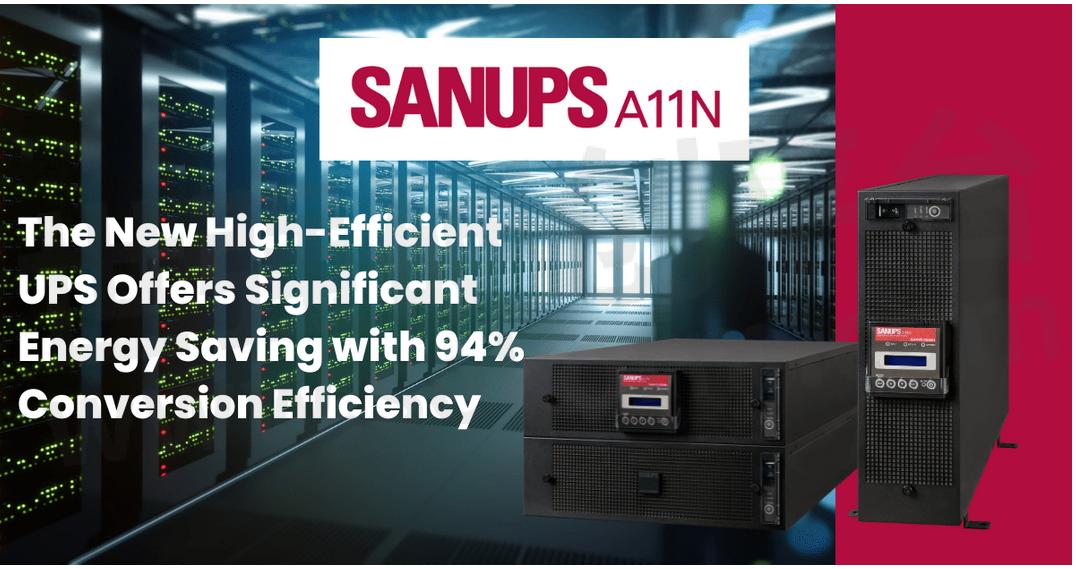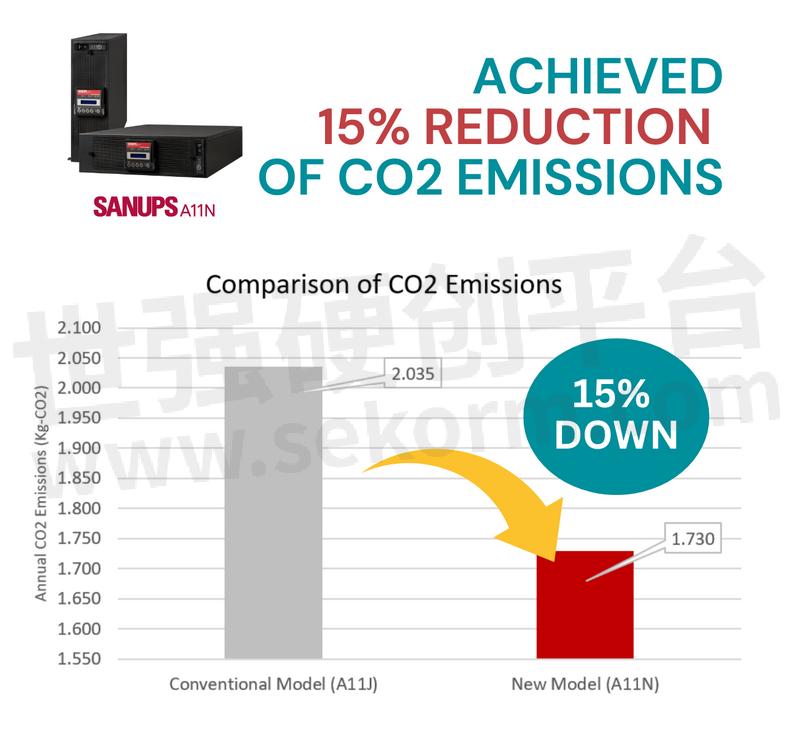SANUPS A11N Offers UPS Highest Power Factor Range and Achieves 15% Reduction of CO₂ Emissions


Achieved a 15% Reduction of CO₂ Emissions

SANUPS A11N, the new model of online UPS offers a significant improvement in environmental performance over the previous model A11J. It has achieved a 15% reduction in CO₂ emissions compared to the conventional model A11J. This was made possible by improving operational efficiency through the evolution of the circuit system and the control system.
Reducing CO₂ emissions from uninterruptible power supplies is crucial for addressing climate change, improving energy efficiency, reducing costs, complying with regulations, and enhancing corporate social responsibility. It contributes to a more sustainable and environmentally friendly operation of critical infrastructure. The new SANUPS A11N design increased output power while reducing CO₂.
Industry's Highest UPS Efficiency
By using a 3-level inverter with proven track records and by performing tuning to match the latest switching semiconductor device, the SANUPS A11N achieves a maximum efficiency of 95.1% (94% at rated output), which is best-in-class in the industry among CVCF (Constant Voltage Constant Frequency) systems. This reduces running costs and contributes to CO₂ emissions reduction.
UPS Compatibility With High Power Factor Loads
UPS systems are designed to deliver power to loads with various power factor requirements. For loads with high power factors, such as servers, the UPS ensures efficient and reliable power delivery by converting AC to DC, regulating voltage, and providing power conditioning. This allows the servers to operate seamlessly, even during power outages or when the input power quality is compromised.
With a 0.9 load power factor, the A11N is capable of providing its power to loads with a high power factor such as servers.
Output capacity of 5kVA => 4.5kW max.
Output capacity of 20kVA => 18kW max
To supply high-quality power, the double conversion online topology was adopted. While the double conversion online topology provides advantages such as voltage and frequency regulation, it doesn’t directly increase the power factor. Power factor correction is typically achieved through additional circuitry and components specifically designed for that purpose. UPS systems with PFC features can help improve power factor, energy efficiency, and reduce the overall strain on the electrical infrastructure.
- +1 Like
- Add to Favorites
Recommend
- SANYO DENKI Develops High-Efficiency Online UPS SANUPS A11N with an Output Capacity Expandable to 20 kVA
- Securing Critical Data: A Design House‘s UPS Solution from SANYO DENKI
- Boost Reliability with SANYO DENKI SANUPS E33A and E23A Parallel Processing UPS
- SANYO DENKI Develops SANUPS E11B-Li Hybrid UPS Can Operate for 10 Years without Battery Replacement
- SANYO DENKI Develops 30 and 75kVA Models for High-Efficiency Online UPS SANUPS A23D
- Introducing the SANUPS A11M of SANYO DENKI: Reliable UPS With Parallel Redundancy
- SANYO DENKI Launches SANUPS A11M 100VAC Highly Reliable Parallel Redundant UPS To The U.S. Market
- SANYO DENKI Launches SANUPS A11M 100/200 VAC Highly Reliable Parallel Redundant UPS To The U.S. Market
This document is provided by Sekorm Platform for VIP exclusive service. The copyright is owned by Sekorm. Without authorization, any medias, websites or individual are not allowed to reprint. When authorizing the reprint, the link of www.sekorm.com must be indicated.





























































































































































































































































































































































































































































































































































































































































































































































































































































































